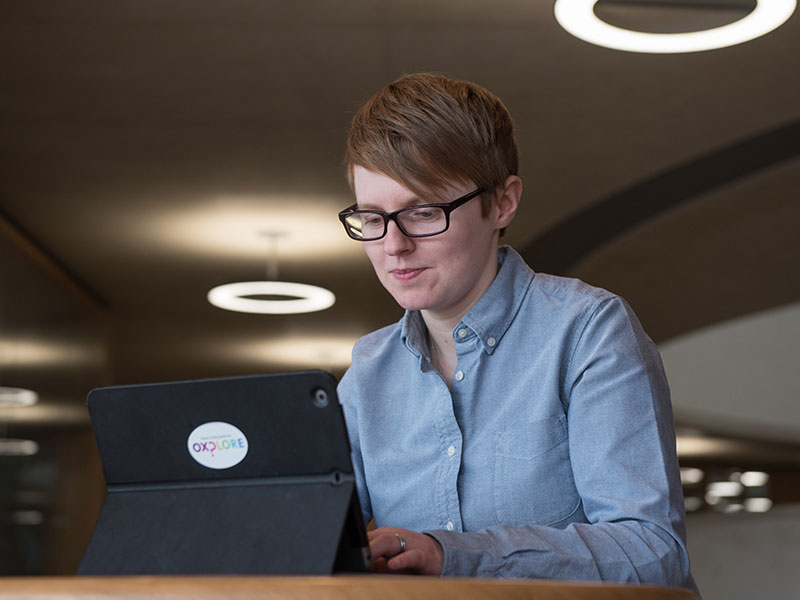'We're certain that it's totally innovative, and we haven't seen anything like it elsewhere on the web,' explains Dr Alex Pryce, from Oxford's Undergraduate Admissions and Outreach team. For two years, Dr Pryce has been working with colleagues from all corners of the University to develop Oxplore, an initiative aimed at engaging young people and potential applicants through digital learning.
Referred to as the 'Home of Big Questions', Oxplore is an online portal through which users can learn about and debate the trickiest issues of our time, including whether guns hurt more people than they protect, and the impact of fake news. The website also tackles some of the trickiest issues of all time, asking us to consider life after death, to what extent money can buy happiness, and whether or not a god exists. Guided by Oxford academics, students are encouraged to consider fresh perspectives, and read and explore subjects further for themselves.

According to Dr Pryce, the response to the initiative has been overwhelmingly positive: 'The first indication is that it's a great success. We can see from our social media interactions and from the website analytics that schools and young people from hundreds of different locations across the UK are using it.' To date, over 40,000 people have used the site, and an estimated 1,500 have interacted with the initiative through workshops, live broadcasts and other forms of outreach.
In many ways, this phenomenal success can be traced back to the very start of the project. 'One of the reasons why we think it's been so ground-breaking is that in having donor funding we were able to be quite open in our initial brief. It has allowed us to do something completely different,' says Dr Pryce. Before launching the website in October last year, the Oxplore team consulted widely with their target audience. Over 200 young people chose the name, selected the bold visual identity, submitted ideas for questions and even helped to inform the learning journey that users take through the site.
It was also during this early phase that the importance of social media became clear. 'We wanted to create something that could exist in the spaces that the target audience frequents,' explains Dr Pryce. 'We think that particularly for young people who might not conventionally interact with Oxford, it could really help to reach them on their mobiles and tablets while they’re at home and just show them genuinely interesting ideas.' To help get the message out, the team runs events with academics and current Oxford students through Facebook Live, as well as regularly posting content across Twitter, Instagram, Snapchat and YouTube. 'This is one way we can get young people on the site without the potential issues that the brand of Oxford might present,' she adds.
We all feel extremely passionate about the mission of the site. It’s genuinely something really exciting to be working on.Dr Alex Pryce
But social media is just one piece of the wider Oxplore puzzle. The initiative is an important part of Oxford's ongoing commitment to reach the best students from every kind of background, and there has been a concerted effort to integrate it with the University's existing outreach programmes. 'Oxplore does not exist in isolation,' says Dr Pryce. 'The idea is that it underpins all of the access and outreach work that’s going on right across the University.'
To this end, the team have been working closely with access officers from Oxford's colleges, departments and faculties to help disseminate Oxplore content to existing audiences. Other fruitful collaborations have also been formed with OxNet, an initiative that places universities at the heart of local communities, and the Study Higher Partnership, which offers students across Milton Keynes, Oxfordshire and Buckinghamshire a range of activities to highlight the opportunities that higher education can provide.
'The idea is that there’s sustained engagement with young people,' explains Dr Pryce. This approach is particularly key for young people who are geographically distant from Oxford, such as those living in the North East, Wales, East Midlands and Yorkshire and the Humber – areas where students are statistically less likely to apply to the University. Being able to reach out to the entire country in this way, including even the most rural and remote of areas, was the initial inspiration behind the programme.

In December, the Oxplore team attended a two-day student conference organised by the Welsh Government, where they ran eight Big Question workshops and met with over 200 young people in Years 11 and 12. Participants were asked to come up with their own questions and consider what tools they might need to answer them – the aim being to get them thinking about how they might prepare for interview and university study. After the event, there was an upsurge in interest from Wales on the website.
As well as enjoying a positive reception from young audiences, Oxplore has also been extremely well received by teaching staff across the UK. In fact, one unexpected outcome has been the establishment of Oxplore clubs within schools. 'It's all about big thinking, super-curricular learning and students following their passions. It's been great to hear about,' says Dr Pryce. The next step is to create even more resources for teachers. 'Teachers want their students to have the best possible learning experience, and so we want to develop something that responds to their needs,' she notes.
For those involved in developing Oxplore, it has been a rewarding journey. 'We all feel extremely passionate about the mission of the site. It’s genuinely something really exciting to be working on,' says Dr Pryce. 'For me personally, having the opportunity to inspire this "big" thinking has been a wonderful experience.’
Oxplore has been made possible by the support of donor Anthony Clake, a PPE alumnus of The Queen’s College, Oxford.